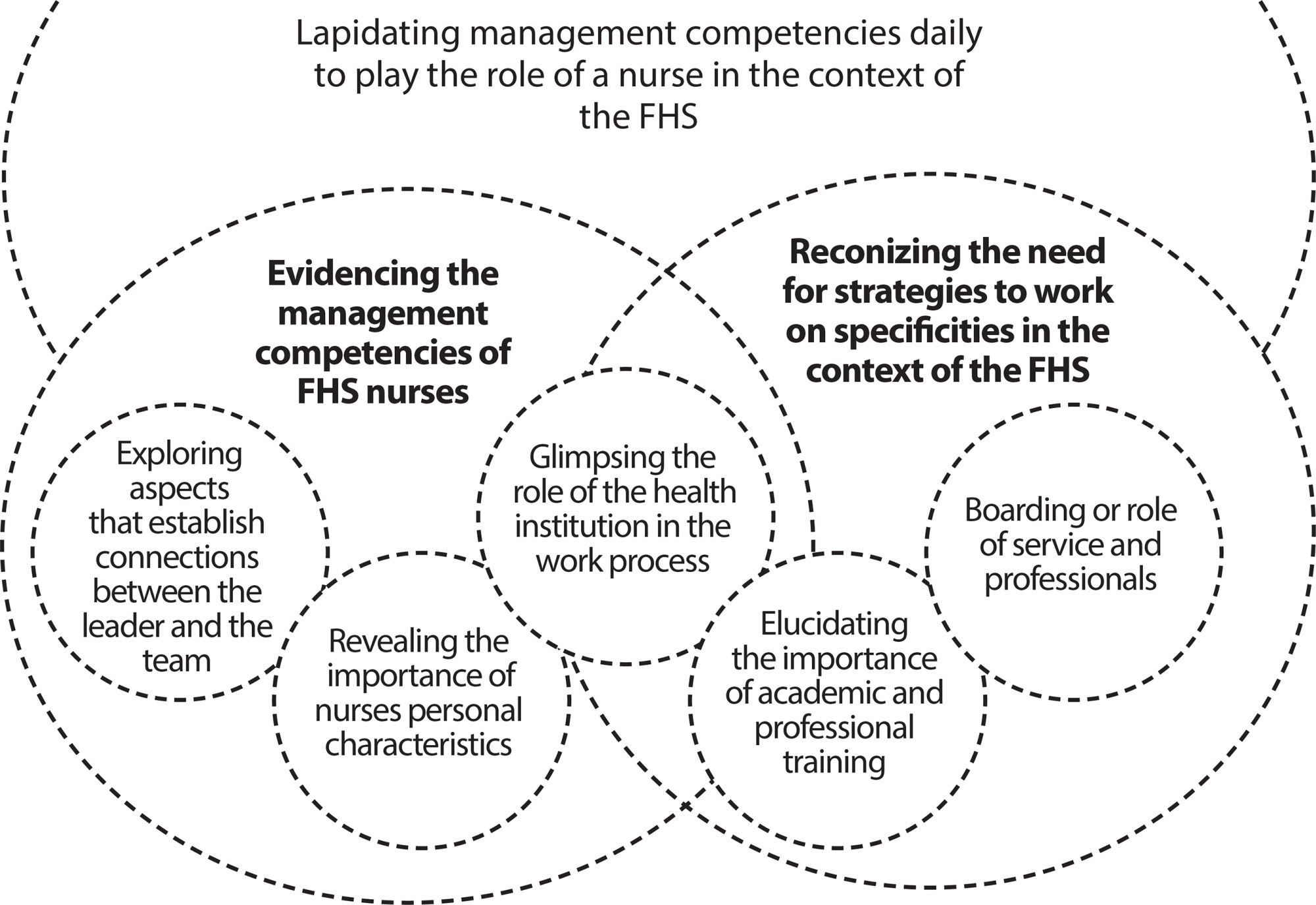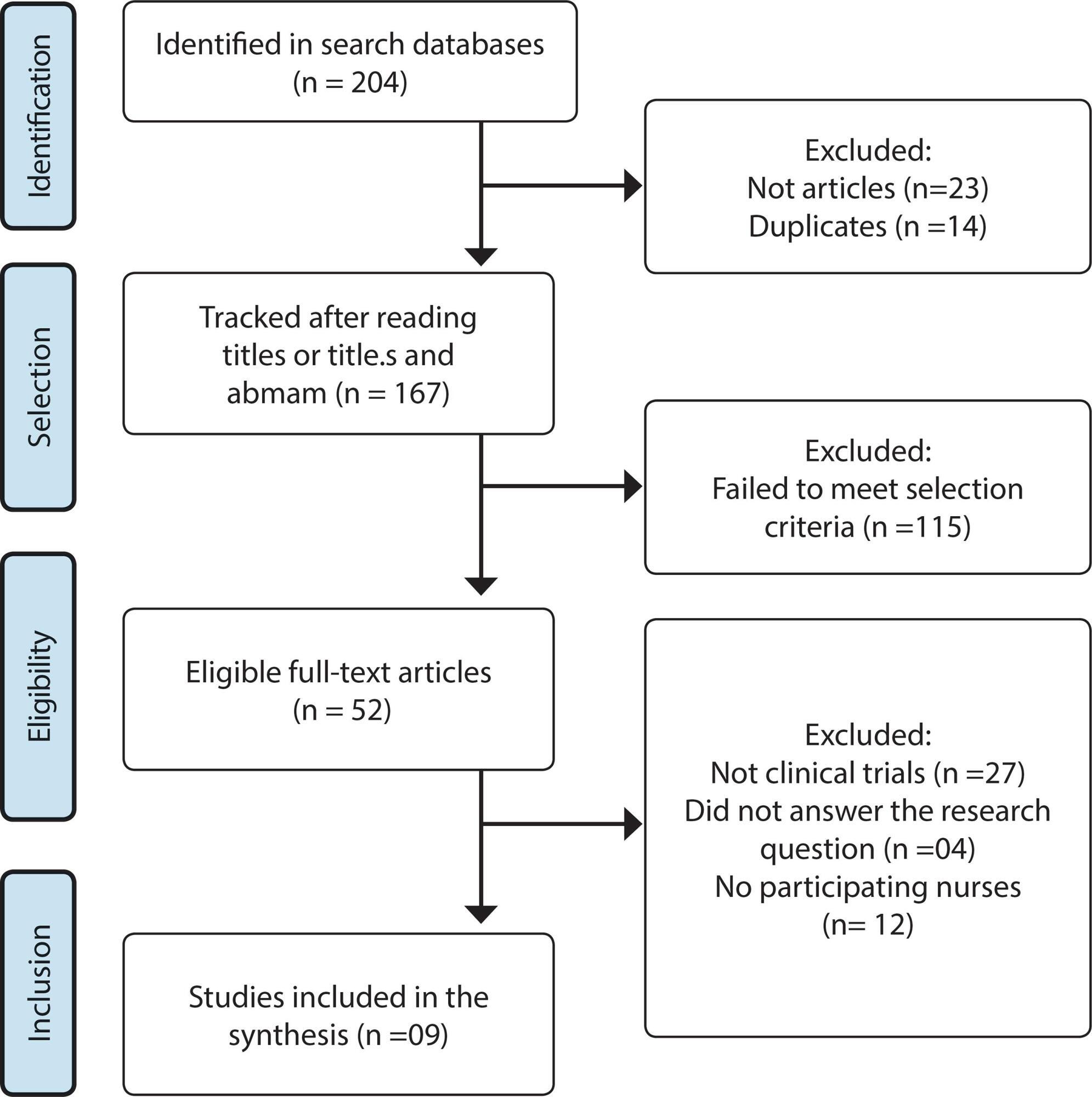-
ORIGINAL ARTICLE
Nursing training from the perspective of graduates
Revista Brasileira de Enfermagem. 2021;74(suppl 5):e20200620
05-24-2021
Resumo
ORIGINAL ARTICLENursing training from the perspective of graduates
Revista Brasileira de Enfermagem. 2021;74(suppl 5):e20200620
05-24-2021DOI 10.1590/0034-7167-2020-0620
Visualizações0Ver maisABSTRACT
Objective:
To correlate the satisfaction of graduates with their training according to their professional characteristics and general competences.
Method:
Descriptive cross-sectional study with a sample of 192 Nursing graduates from a private higher education institution in the city of São Paulo. Data were collected between 2016 and 2017.
Results:
Graduates placed in the job market within one year (p=0.01) had nursing as their main source of income (p=0.011) and occupation (p=0.014); those who considered themselves professionally successful and those who would choose the profession again (p=<0.001), if they could choose, were more satisfied with their training. Satisfaction with training was linked to the competences acquired during graduates’ training, such as decision making (p=0.002), leadership (p=0.004) and continuing education (p=0.005).
Conclusion:
The study shows that most graduates consider their training satisfactory when analyzed with the study variables.
-
REVIEW
Strategies and competences of nurses in men’s health care: an integrative review
Revista Brasileira de Enfermagem. 2020;73(suppl 6):e20190546
12-21-2020
Resumo
REVIEWStrategies and competences of nurses in men’s health care: an integrative review
Revista Brasileira de Enfermagem. 2020;73(suppl 6):e20190546
12-21-2020DOI 10.1590/0034-7167-2019-0546
Visualizações0Ver maisABSTRACT
Objectives:
to synthesize scientific evidence on nurses’ strategies and competencies in men’s health care.
Methods:
an integrative review carried out in seven databases, with a time frame from 2009 to 2019, using the descriptors “men’s health”, “professional competence”, “nursing”, “nursing care” and “male” in Portuguese and in English.
Results:
ten articles were selected, in which it was demonstrated that nursing professionals develop their professional practices with regard to men’s health care, in convergence with the general skills of the profession. The most used are health care; decision-making; Communication; administration; management; continuing education and leadership, consecutively.
Final Considerations:
professionals’ efforts to strengthen health actions, aimed at male needs, in accordance with the general skills of the profession and the principles and guidelines of the Brazilian National Policy for Comprehensive Care to Men’s Health.

-
ORIGINAL ARTICLE
Strategies used by nurses for conflict mediation
Revista Brasileira de Enfermagem. 2020;73(suppl 5):e20190894
12-21-2020
Resumo
ORIGINAL ARTICLEStrategies used by nurses for conflict mediation
Revista Brasileira de Enfermagem. 2020;73(suppl 5):e20190894
12-21-2020DOI 10.1590/0034-7167-2019-0894
Visualizações0ABSTRACT
Objective:
to understand what are the strategies used by nurses to mediate conflicts.
Method:
a qualitative and descriptive study that used oral history, carried out in the organ transplant unit of a university hospital located in the city of São Paulo, SP, Brazil. The population consisted of seven nurses with one year or more of experience in the unit. Data collection took place with semi-structured interviews. The reports were transcribed, and their content was analyzed according to Minayo’s model.
Results:
three categories have emerged: Conflict-generating sources; Strategies for conflict mediation such as collaboration, dialogue, standardization, and expressive action by nurses to mediate conflicts; Consequences of conflicts.
Conclusion:
there is a need to invest in the training of nurses to mediate conflicts, and it is important to develop skills such as interpersonal relationships and communication for the success of their professional performance.
Palavras-chave: NegotiationNursingNursing Administration ResearchProfessional CompetenceQualitative ResearchVer mais -
ORIGINAL ARTICLE
Attitudes, knowledge and skills of nurses in the Xingu Indigenous Park
Revista Brasileira de Enfermagem. 2020;73(6):e20190632
09-07-2020
Resumo
ORIGINAL ARTICLEAttitudes, knowledge and skills of nurses in the Xingu Indigenous Park
Revista Brasileira de Enfermagem. 2020;73(6):e20190632
09-07-2020DOI 10.1590/0034-7167-2019-0632
Visualizações0Ver maisABSTRACT
Objective:
to analyze the attitudes, knowledge and skills that make up the professional competencies of nurses working in indigenous territories.
Method:
this is an exploratory-descriptive study with a qualitative approach, conducted with nurses working in the Xingu Indigenous Park in 2016. Data were obtained in semi-structured interviews and treated according to the thematic-categorical analysis method.
Results:
the nurse’s performance in the Xingu Indigenous Park has a multifaceted character, being defined by the territory’s interculturality and specificities and by how the service is organized. Technical skills, concepts from anthropology and attitudes that facilitate a respectful dialogue with cultural difference are required for a professional to act in this context.
Final considerations:
the performance of health professionals in indigenous territories requires specificities associated with the acquisition of new knowledge, attitudes and skills geared to the intercultural dimension of the work developed.
-
ORIGINAL ARTICLE
Construction of the matrix of individual nursing competences in surgical units
Revista Brasileira de Enfermagem. 2020;73(6):e20190584
09-07-2020
Resumo
ORIGINAL ARTICLEConstruction of the matrix of individual nursing competences in surgical units
Revista Brasileira de Enfermagem. 2020;73(6):e20190584
09-07-2020DOI 10.1590/0034-7167-2019-0584
Visualizações0Ver maisABSTRACT
Objective:
to build and to describe an Individual Skills Matrix for nurses working in surgical units and their associated behaviors / attitudes.
Method:
Exploratory, qualitative study. 43 nurses from five surgical units participated, and data collection was carried out between April and September 2017. The focus group technique was used and for data interpretation an inductive thematic analysis was performed. The competence matrix was built from the testimonies of the participants plus a search in the literature for concepts directed to each competence and description of the expected behaviors and / or attitudes.
Results:
For the Matrix, the following individual skills were identified: Planning; Communication, Relational Competence, Leadership, Decision Making and Ethics.
Final Considerations:
The construction of a Matrix should assist managers in recognizing the professional profile and assessing their performance, strengthening the achievement of professional and organizational objectives, as well as contributing to the quality and effectiveness of the care provided by nurses in these places.
-
ORIGINAL ARTICLE
Essential management competencies of nurses: actions and interactions in the context of the Family Health Strategy
Revista Brasileira de Enfermagem. 2020;73(6):e20190511
09-07-2020
Resumo
ORIGINAL ARTICLEEssential management competencies of nurses: actions and interactions in the context of the Family Health Strategy
Revista Brasileira de Enfermagem. 2020;73(6):e20190511
09-07-2020DOI 10.1590/0034-7167-2019-0511
Visualizações0ABSTRACT
Objective:
to understand the meanings attributed by the Family Health Strategy (FHS) nurses to the management competencies essential to the performance of their actions.
Method:
explanatory, qualitative study, whose methodological framework was based on Grounded Theory. A total of 12 Family Health Strategy nurses from a municipality in southern Brazil participated through semi-structured interviews, between December 2018 and February 2019.
Results:
the experience was understood by the phenomenon “Lapidating management competencies daily to play the role of a nurse in the context of the Family Health Strategy”. As action/interaction strategies, the following categories emerged: “Evidencing the management skills of Family Health Strategy nurses” and “Recognizing the need for strategies to work on specificities in the context of the Family Health Strategy”.
Final considerations:
according to the meanings attributed by nurses, there are several essential management skills for the work in the Family Health Strategy, but they are still little worked and developed in this context, mainly because it is a complex health care scenario.
Palavras-chave: Family Health StrategyNursingNursing Administration ResearchPractice ManagementProfessional CompetenceVer mais
-
ORIGINAL ARTICLE
Nurses’ practice in quilombola communities: an interface between cultural and political competence
Revista Brasileira de Enfermagem. 2020;73(5):e20190433
07-08-2020
Resumo
ORIGINAL ARTICLENurses’ practice in quilombola communities: an interface between cultural and political competence
Revista Brasileira de Enfermagem. 2020;73(5):e20190433
07-08-2020DOI 10.1590/0034-7167-2019-0433
Visualizações0ABSTRACT
Objectives:
to understand Family Health Strategy nurses’ practices in the context of quilombola communities with an interface for cultural and political competences.
Methods:
a single integrated, qualitative case study carried out on seven Family Health Strategies located in the Metropolitan Region of Belo Horizonte, state of Minas Gerais. Seven nurses and 59 quilombolas participated. Data were collected through individual interviews with nurses, collective interviews with quilombolas and observation. For analysis, the thematic content analysis was adopted.
Results:
the results revealed structural and territorial problems, which are configured as barriers for professional-user encounter as well as for professional practice performance.
Final Considerations:
it is necessary that Family Health Strategy nurses, based on political and cultural competences, create strategies that minimize the difficulties found in the implementation of health actions directed to quilombolas. Such strategies anchored in inclusive public policies.
Palavras-chave: African Continental Ancestry GroupCultural CompetencyNursingPrimary Health CareProfessional CompetenceVer mais -
REVISÃO
Nurses’ competencies in health promotion for homebound older people
Revista Brasileira de Enfermagem. 2019;72(suppl 2):311-318
12-05-2019
Resumo
REVISÃONurses’ competencies in health promotion for homebound older people
Revista Brasileira de Enfermagem. 2019;72(suppl 2):311-318
12-05-2019DOI 10.1590/0034-7167-2018-0446
Visualizações0Ver maisABSTRACT
Objective:
to identify competencies related to health promotion targeting homebound older people, as they appear in the literature.
Method:
systematic review using the LILACS, Scopus, CINAHL, PubMed and Cochrane Library databases. The search was performed in November 2017. Selected articles were analyzed according to nine competency domains: enable change; advocate for health; mediate through partnership; communication; leadership; assessment; planning; implementation, and evaluation and research.
Results:
nine clinical trials were included. All health promotion competency domains were identified in the reviewed research interventions, performed with homebound older people.
Conclusion:
studies showed that the employed treatments were beneficial for the homebound older population. Interventions based on health promotion competencies were positively identified, and are linked to an effective and high-quality health care practice.




